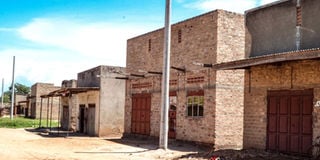Traders abandon landing site as fishing business slows down

Deserted. Some of the commercial buildings that have been abandoned in Lwampanga Town due to slow businesses in the area. PHOTO BY DAN WANDERA.
What you need to know:
- Ghost town. The suspension of fishing, the major economic activity in Lwampanga, has left the town more or less a shadow of its former self.
Until early this year, Lwampanga was one of the fastest-growing towns in Nakasongola District, but the town is now slowly sinking into deeper economic stagnation.
The town, which attained a town council status last year, is an access route to the northern districts on the shores of Lake Kyoga.
A visit to the area on Tuesday reveals that more than 120 residential and business buildings are currently deserted.
This worrying situation is blamed on the slow or no fishing activities on Lake Kyoga.
Fishing is the major economic activity in the area, but it was suspended in April by the army’s Fisheries Protection Unit (FPU) to allow soldiers register fishermen and also enable them acquire standard boats and fishing gear.
Although the suspension was to last for two months, it has persisted to date.
Old good days
According to Mr David Bukenya, the Lwampanga Sub-county chief and acting town clerk, the booming fishing business had attracted many people who had settled in the area, but a good number of them have since relocated.
“We had never anticipated that Lwampanga Town that was very promising in terms of business, would one day be deserted,” he says.
Apart from fishing, the town was a beehive of activities with businesses such as bars, shops, restaurants, and fuel stations, which have also closed.
Mr Bukenya says before FPU launched its operations to clean up Lake Kyoga in April, Lwampanga Town had a population of about 25,000 people, but the number has since reduced to about 2,500.
“Those [traders] who had tried to remain had to relocate to other areas in fear that they could face the wrath of the money lenders and banks that had extended loans to them to construct buildings and capital for their prospective businesses,” he says.
Mr George William Lubega, the Lwampanga Sub-county chairperson, corroborates Bukenya’s assertion that many individuals had acquired loans to invest in permanent structures to tap into the promising business opportunities in the area when government constructed a multi-billion fish handling facility in the area.
“The buildings are abandoned because of the threats of arrests by the FPU enforcement team, who often launch operations to check for individuals who could be in possession of illegal fishing gear. Also, loan officers who want to recover the accumulated loan arrears advanced to different people are on their necks. This explains why many of the abandoned buildings have inscriptions ‘Bank property, for sale’. The banks have even failed to sell the buildings because the properties cannot fetch the amount they need. This is the situation on the ground,” Mr Lubega says.
Mr Simon Edward Sseremba, a trader, who has since relocated to Nakasongola Town Council, says he borrowed money to facilitate completion of a commercial building in Lwampanga, but was forced to relocate when businesses slowed down in April.
“I gave authority to the loans officers to sell off the building because I have no capacity to finance the loan that is already in accumulated arrears. My case is representative of many other business people who have fled Lwampanga Town. We are not sure about the future of businesses in that town,” Mr Sseremba says.
Ms Tezira Nanyomo, 48, a mother of six, who has since relocated to Wabaale Village in Nakasongola Town Council, claims she had constructed a permanent house at Lwampanga using a loan from a microfinance institution, but she was forced to leave to escape the loan officials.
“I was dealing in fish and my family lost the business in April after soldiers suspended fishing activities on Lake Kyoga. I was forced to surrender the building because I had no alternative source of income,” Ms Nanyomo says.
“It is true that suspension of fishing on the lake has deprived many families of their livelihood without an easy alternative and some have become destitute. But we have hope that the town will one time rise again,” Mr Fred Bogere, the Nakasongola District Council speaker, says.
Other landing sites in the district which people have deserted include Zengebe, Kitalaganya, Moone, Lwampanga, Kikoiro, Kibuye, and Ninga.
Background
FPU. the army’s Fisheries Protection Unit was formed by President Museveni in January 2017, to crackdown on illegal fishing on Ugandan water bodies, which was blamed for the dwindling fish stock in the country. This has in the last couple of years seen fish stock in Lake Victoria, especially Nile perch, significantly multiply.
Impact
District authorities say... The Nakasongola District chairperson, Mr Samuel Kigula (pictured), says the slow pace of businesses at Lwampanga has partly affected the district revenue.
“We are observing what is going on there [Lwampanga], but the fact is that it is affecting our revenue as well. We just pray that the operations against illegal fishing are swiftly conducted and allow our people resume normal business,” he says.
Additional reporting by Al-Mahdi Ssenkabirwa.




